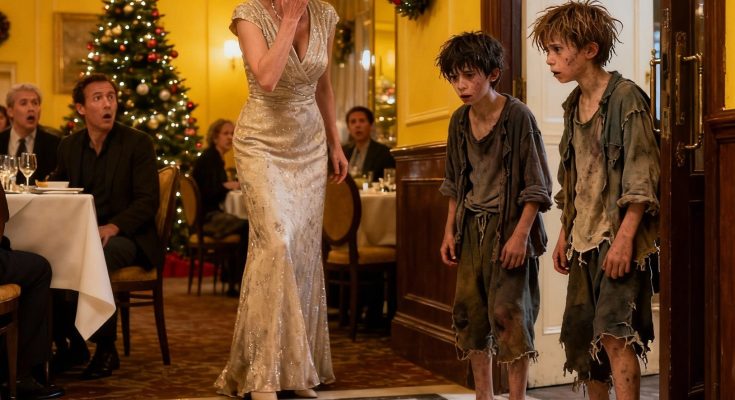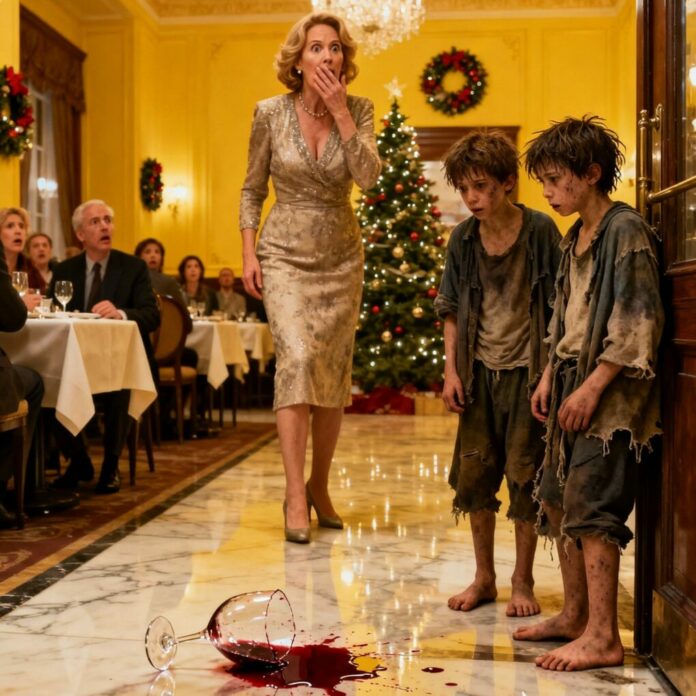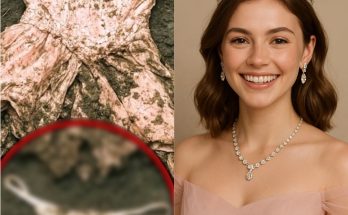“Can we just have your leftovers?” The homeless child asked. The woman looked up—and dropped her glass in shock…-TAMMY
The lights inside La Veranda, one of Manhattan’s most exclusive restaurants, glowed warm against the cool afternoon outside. Businessmen in tailored suits murmured over steak and wine, crystal glasses clinking softly. At the center table sat Margaret Hayes, a polished woman in her late forties, admired in real estate circles for her power, poise, and wealth. She was used to attention—but today, she seemed tired behind the diamonds and silk.
Just as a waiter poured her tea, a quiet voice broke through the elegant atmosphere.
“Ma’am… can we have some of your leftovers?”
Conversation halted. Heads turned. At the entrance stood two boys—thin, dirty, and shaking. The older one, about twelve, shielded the younger, who clutched his shirt tightly. Their hair was unkempt; their clothes had holes; their bare feet were numb on cold marble.
Margaret’s eyes lifted—and froze.
The older boy. His jawline. His eyes. The small scar just above his right eyebrow.
Her heartbeat stumbled.
“Ethan?” she whispered.
The boy stiffened. “How do you know my name?”
Every seated patron felt the air shift. A manager stepped in, clearly ready to remove the boys to avoid “disturbance,” but Margaret raised her hand sharply.
“No.” Her voice trembled.
She stood, walking toward them slowly, as if approaching a ghost.
“It’s… me,” she said softly. “I’m your mother.”
The younger boy tugged at Ethan’s sleeve. “Come on, let’s go. She’s just pretending.”
But Ethan didn’t move. His jaw tightened. “My mom died. They told me she died in that crash.”
Margaret fumbled inside her purse, hands trembling, and pulled out a worn photograph—a little boy on a beach laughing brightly.
“This has stayed with me every day,” she whispered.
Ethan stared at the photo, his fingers shaking. The room was silent—every breath held.
“We ran away… from the foster home,” Ethan murmured finally. “It wasn’t safe. We’ve been living behind the train station.”
Margaret’s eyes filled with tears. “Come with me. Just for tonight. Please.”
After a long pause, Ethan nodded once.
Margaret reached for his hand—touching him for the first time in seven years.
But as they stepped toward the exit, a man in a black coat suddenly blocked their path. His voice was hard.
“Ethan. Lucas. You shouldn’t have come here.”
Margaret’s blood turned cold.
“Who are you?” she demanded.
The man smiled slightly.
“Their guardian.”
The car ride back to Margaret’s penthouse was tense. The man in the black coat—Mr. Darrel Crane, director of the foster group home—sat rigidly, his gaze fixed ahead. Margaret had insisted they all come together so everything could be clarified “civilly.” But her heart hammered with unease.
Lucas, the younger boy, leaned close to Ethan, whispering fears Margaret couldn’t hear. Ethan just stared out the window, jaw locked.
When they arrived, Margaret led them into her expansive living room—white walls, framed city skyline, polished floors that reflected the chandelier’s glow. It was a world Ethan once belonged to—but now looked like a museum exhibit of a life stolen.
Crane spoke first. “Mrs. Hayes, let’s be direct. These boys are wards of the state. Ethan was declared without family. Legally, you have no claim.”
Margaret drew a breath. “Because I was told my son had died. I was recovering from the crash—while someone filed paperwork saying he was gone. Who signed it?”
Crane didn’t answer.
Ethan flinched. He remembered the home. The nights. The fights. The fear. Lucas had been the only safe thing in that place.
Margaret knelt beside her son. “I searched hospitals. Shelters. I refused to believe you were gone. I never stopped looking.”
Ethan swallowed. “We waited. We thought no one wanted us.”
Crane’s voice cut through. “We’re leaving. Tonight.”
Margaret stood, steel replacing grief. “No. Not until we understand how my son was declared dead without verification. I will reopen every record. Every police report. Every foster case file.”
Crane’s eyes hardened. “With your money, you think you can rewrite what happened?”
“No,” Margaret said quietly. “With the truth.”
Ethan stepped forward. “I don’t want to go back.”
Lucas echoed him, voice shaking. “Me neither.”
Crane took a step toward them—and Ethan flinched backward.
Margaret stepped between them. “If you touch them, I will have you removed from this home.”
There was silence—thick and dangerous.
Crane finally turned for the door. “This isn’t over. You’re not the only one with resources, Mrs. Hayes.”
The door shut.
Margaret’s hands trembled—but when she looked at Ethan and Lucas, her voice was steady.
“You’re safe here. Both of you.”
But safety would not come easily. Not in court. Not in the public eye. And not in Ethan’s wounded heart.
The legal battle lasted months. Old case files were dug up. Doctors reviewed records. And slowly, a horrifying truth emerged: a hospital clerk, overwhelmed and rushed, had mistakenly marked an unidentified child in another ward as Ethan Hayes. The foster system accepted the paperwork without cross-checking DNA or identity—Ethan had simply vanished into bureaucracy.
It took media coverage and legal pressure for the truth to surface.
During those months, Margaret transformed. The sharp businesswoman faded; in her place stood a mother—apron dusted with flour while she learned to cook again, sitting through therapy sessions, reading bedtime stories, and staying up whenever nightmares dragged Ethan back to cold nights under bridges.
Lucas, who had never known stability, began smiling more. The cook taught him to bake cookies. He learned to laugh.
Ethan was slower to heal. He often stood at windows for long periods, staring at the city below, processing the years lost. But little by little, he let Margaret in—first with questions, then conversations, then hugs that lasted longer each time.
When the court hearing finally arrived, Margaret held both boys’ hands. Crane sat across the aisle, jaw tight. But Ethan had found his voice.
He stood to speak.
“I survived because Lucas was with me. We took care of each other. We didn’t have much, but we had hope. I want to stay with my mom now. And I want Lucas to stay too. We’re a family. We choose each other.”
It was enough.
The judge granted full custody of Ethan to Margaret—and approved her petition to adopt Lucas.
Months later, Margaret founded The Firefly Home, a shelter and rehabilitation center for runaway and homeless children. Ethan and Lucas helped paint the walls, choose the furniture, and design the recreation room. They knew exactly what kids like them needed: safety. Warmth. A chance.
On opening day, Ethan stood beside his mother on the small stage outside the building’s entrance. Cameras flashed, but he didn’t shrink back this time.
“When life gets dark,” he said, “even the smallest kindness can be a firefly. Something that tells you it’s not over yet. We want to be that light for others.”
Margaret put her arm around him, tears in her eyes.
And just like that—their family wasn’t just healed.
It was growing.
If this story touched you, share it—so more people remember that compassion can change a life.




